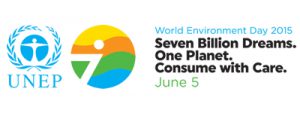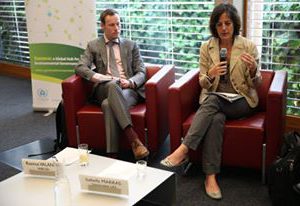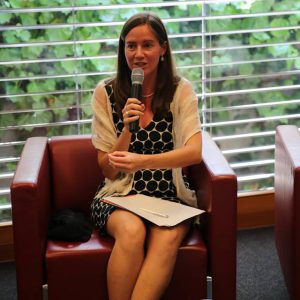Événement
World Environment Day 2015 Roundtable

Addressing Sustainability through Procurement
This year’s theme, ‘Seven Billion Dreams. One Planet. Consume with Care’, encourages people to rethink their lifestyles and, through conscious consumer decisions, decrease humanity’s collective impact on nature’s resources.
According to UNEP’s International Resource Panel (IRP), if unsustainable consumption and production patterns persist, by 2050 we will be using three planets- worth of natural resources to maintain our ways of living. This means that it will take three years for the Earth to regenerate the resources we use in one year. By 2050, humanity could be devouring about 140 billion tonnes of minerals, ores, fossil fuels and biomass per year – three times its current appetite – unless economic growth rate is decoupled from the rate of natural resource use.
The Geneva Environment Network Secretariat organized a Roundtable to celebrate World Environment Day 2015, which addressed sustainability through procurement. As part of the Post-2015 Development Agenda, representatives from various organizations discussed the transition to the Green Economy through sustainable procurement, and frameworks for the promotion of responsible and sustainable procurement, presenting initiatives, experiences and challenges.
Full list of the World Environment Day’s events in Geneva available here: www.jme-ge.ch/
World Environment Day general website www.unep.org/wed
AGENDA
8.45
Breakfast
offered by Swiss Confederation, Geneva Canton and City of Geneva
9:15
Official speeches
9.30
Roundtable “Addressing Sustainability through Procurement”
Steven STONE, Head, UNEP Economics and Trade Branch
Anders AEROE, Director, ITC Division for Market Development
Isabella MARRAS, Coordinator, Sustainable UN facility
Véronique DIEBOLD, Geneva State Service of Sustainable Development
Rasmus VALANKO, Manager, WBCSD Energy and Climate Department
Oshani PERERA, Director, IISD Public Procurement and Infrastructure Finance
11:00
End
Discussion and documents
Steven Stone opened the event and introduced the speakers.
Oshani Perera explained why procurement is important for sustainability and how it can make a difference in a world with seven billion consumers.
Anders Aeroe spoke about what countries and policy-makers can do to provide the prompts and policy that can take sustainable procurement to scale.
Rasmus Valanko explained how WBCSD interacts with a lot of the major multinational companies that are responsible for managing and delivering on vast swaths of goods and services that make up our everyday consumption, what is the scope for greening these value chains and opportunites for the private sector.
Veronique Diébold spoke about actions at the local level and some of the key insights the State of Geneva learned.
Isabella Marras detailed what the UN is doing about making procurement a driver of sustainability in its own right, and the opportunities for change.
Key points from the discussion
- Public procurement represents a massive proportion of GDP ranging from 15%-18% in the EU to upwards of 30% in developing countries (and could be argued as 100% of GDP if you include private procurement).
- Immature state of markets cause for a lock of competitiveness of green products and services.
- Opportunities to ease market access: a) Give market lead time (create policies and inform well in advance); b) Use aggregate deals to increase purchasing power; c) Specify a functionality in procurement policies, rather than a type of product or certification scheme to allow for innovation.
- There are challenges in defining sustainable procurement without an agreed upon definition of sustainability.
- Sustainable sourcing drives value chains.
- There is opportunity for sustainable public procurement to address inequality issues as well.
- Governments should play an important role in demonstrating the efficacy of new ‘green’ products and services through private-public partnerships.
- Additional challenge for developing countries that can’t afford to take this risk (audience comment, Indian permanent mission).
- Governments role should also include subsidizing green technology by shouldering some of the risk in utilizing untested green technologies to encourage innovation.
- Creating standards and certification methods for sustainable public procurement can help achieve a critical mass in market uptake.
- Canton of Geneva: 1 billion CHF used annually for SPP.
- UN: 18 billion USD used annually for SPP from 13 UN agencies.
https://www.genevaenvironmentnetwork.org/wp-content/uploads/2020/05/wed_2015_roundtable.pdf
https://www.genevaenvironmentnetwork.org/wp-content/uploads/2020/05/biographies_5_june_2015.pdf









